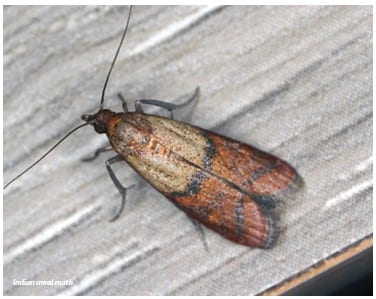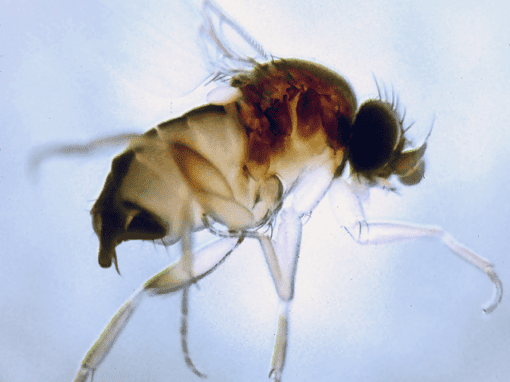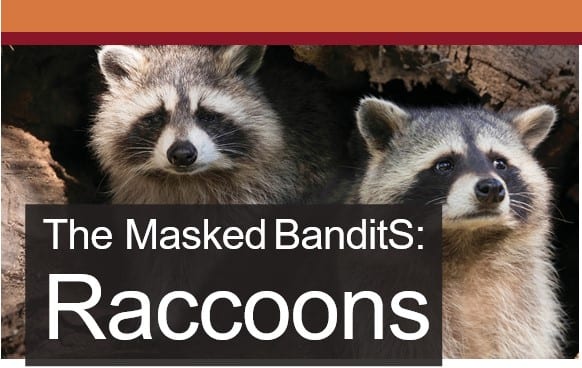In this Issue of the Fall 2020 Pest Gazette
In this issue of the Fall 2020 Pest Gazette, you’ll learn all about some pests that are not DIY pests. There’s also some great info about pantry pests called Indian Meal Moths, just in time for holiday baking. Raccoon habits and nuisance wildlife are covered. And for something positive, mosquitoes do NOT transmit Coronavirus. Get your home or business buttoned up for cooler weather ahead and do some pest-proofing now to prevent pest issues over the winter into next spring.
Phorid Flies: Better left to professionals.
There are few pests more irritating than Phorid flies. These small, humpbacked flies may seem unassuming to the naked eye. But, they can completely wreak havoc in the home and be a long-term nuisance without proper inspection and treatment. Phorid flies will lay their eggs, and develop in decaying animals, plants, fecal material, and other organic matter. They are sometimes also called scuttle flies because they will erratically run around on surfaces. Another alternative name for these flies are coffin flies because they are known to frequent mausoleums and infest recently deceased remains.
Work with a pest management company when you have an infestation of small flies. They’re not DIY pests. Phorid flies can be especially difficult to control because it’s important to find the source of the infestation and where the flies are breeding. The application of products alone will not solve a Phorid fly infestation, or many other small flies that can infest homes. If you suspect Phorid flies are in your home, give us a call to come do a thorough inspection of your home. You could be dealing with an animal hidden in a void. There might be some type of garbage issue you are not aware of. In more difficult situations, there may be an actual sewage problem underground. We will come inspect and get to the root of the problem.

Indian meal moth by Rose Pest Solutions
Moths in the Pantry
Fall means Halloween, apple crisp, pumpkin pies, cornucopias and harvest decorations. But sometimes the things we use to decorate our homes can harbor unwanted guests like the Indian meal moth!
Indian meal moths are considered a pantry or stored product pest. The adult moth female lays her eggs in products such as corn kernels (including pop corn), rice, nuts, seeds, beans, dried fruits, chocolate, spices, flour, oats and cereals. A single female can lay up to 300 eggs at a time! A small yellow larva will hatch out of the egg and wander around within the product to feed. Larvae do the damage to the product and are responsible for the holes you may see in kernels as well as small bite marks, webbing and fecal material. A larva then spins a cocoon or pupal case from which an adult will emerge to mate. Then the cycle will begin all over again.
Often times, Indian meal moths are brought into the home in such products as birdseed, dog and cat food, or even infested cereals or beans from a grocery store. They tend to be in products that rotate slowly off grocery store shelves. When shopping, always inspect products for signs of infestation — larvae, webbing, holes in packaging, or the pupal cases or adult moths themselves. If by chance you do accidentally bring them home, we can help you get rid of them.
The Masked Bandits: Raccoons
Raccoons prefer wooded areas near water and in natural habitats. However, this nocturnal animal adapts extremely well to urban and suburban environments, where it often dens in backyards and beneath decks. Your attic, chimney and the crawlspaces beneath your house may also serve as their home when access can be gained. Since raccoons are most active at night, they may be undetected for some time. Often a rattling garbage can or dog’s bark is the first real sign of danger.
Raccoons are some of the most widespread, omnivorous mammals in the U.S. They consume a varied diet that includes berries, insects, fruit, chickens, and small mammals. Raccoons sometimes wash, or douse, their food in water before eating it. They will eat almost anything, and they readily come to garbage cans and pet food containers left on porches and patios.
They’re cute, but do massive damage
Since these animals are adept at opening things with their hands, they can also enter many spaces other animals cannot. Pregnant females will often enter a garage, attic or chimney space to nest and have their young. If later prevented from accessing her young, the mother raccoon will then destroy anything in her path in an attempt to be reunited with them. This can create quite a mess for a homeowner in terms of physical destruction to the structure. It can also result in dead and decaying young carcasses, creating offensive odors and drawing flies and other unwanted pests to it. Between public health concerns, unwanted destruction and strict guidelines for removal of wildlife, Racoons are not DIY pests. It is best to leave trapping and relocation of raccoons to a nuisance wildlife removal expert.
While we don’t provide nuisance wildlife removal services, we can at least connect you with some friends that we know and trust to handle live animal situations humanely. If a raccoon appears to be aggressive and showing abnormal behavior, such as appearing sick or disoriented, proper authorities should also be notified.
Mosquitoes Do Not Transmit Coronavirus
While 2020 has continued to surprise everyone, one positive surprise is that mosquitoes are not capable of transmitting Coronavirus. Coronavirus is a respiratory viral disease that, according to the CDC, is primarily transmitted from one person to another. While we constantly learn more about this virus, a group of scientists did conduct a study to definitively say that mosquitoes are not capable of transmitting the Coronavirus.
We know that mosquitoes are capable of transmitting several other diseases, like West Nile, Eastern Equine Encephalitis and malaria. For a mosquito to transmit disease, they have to bite an infected person and be able to get enough of the virus, parasite or bacteria into their stomach and also be able to replicate the disease agent in their bodies to inject it into another animal or human. Thankfully, the newest research on Coronavirus and mosquitoes showed that mosquitoes that were infected directly with Coronavirus couldn’t replicate the virus in their own bodies and spread the virus.
They’re still dangerous
While this may provide some relief, remember that mosquitoes transmit other diseases. Protect yourself from their bites. When outdoors, wear an EPA registered repellent with ingredients listed as DEET, picaridin, IR3535, oil of lemon eucalyptus, para-menthane-diol or 2-undecanone that are proven to be effective against mosquitoes. Always follow the label direction on application for maximum effectiveness. If you are concerned about mosquitoes, or are getting bitten regularly outside your home, contact us. We will help.
We Can Get Rid of Your Fall Pests
Thanks for reading this issue of the Fall 2020 Pest Gazette. Check out our Healthy Home Maintenance Program to learn more about the steps we take to meet your individual needs. We’re here to help you maintain a happy, healthy, pest-free home. For protection you need all year ’round, and peace of mind you deserve, contact us today. Our professional crew is only a call or click away!





